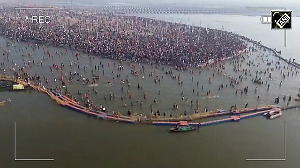Having secured the English league title, Chelsea now plan to paint the world blue.
Backed by Roman Abramovich's billions, and with new club sponsor Samsung adding corporate muscle, the London club aims to rival Manchester United as the English side of choice in the growth markets of Asia and North America.
 Premier League matches are beamed to 195 countries, a global television reach of 600 million homes, and Chelsea's share of the viewing figures has been on the rise since Jose Mourinho's men began sweeping all before them at home and in Europe.
Premier League matches are beamed to 195 countries, a global television reach of 600 million homes, and Chelsea's share of the viewing figures has been on the rise since Jose Mourinho's men began sweeping all before them at home and in Europe.
The club says that its British fan base has increased by 300 percent over the past two years to 2.9 million people, and is approaching 20 million internationally.
Chelsea's ground nestles in one of the most fashionable areas of London and it has plenty of well-heeled local support and a wider base in England's prosperous south-east.
"With the highest personal income levels among any club fans in Europe, it's probably not surprising that Chelsea fans spend the most on match days and are the biggest consumers of club-related products in the UK," the club's business affairs director, Paul Smith, said.
Recognition of Chelsea's growing popularity was behind the approach from Samsung, the South Korean mobile phones and electronics giant.
The five-year deal, starting next month, includes the company's Samsung Mobile logo on Chelsea's shirts and is worth a reported 50 million pounds ($95 million).
Explaining why his parent company had beaten a path to west London, Samsung's European chief Kim In-soo said simply: "Football is the most popular sport in the world and Samsung is a global company.
"Chelsea are a rapidly rising star in world football and ...Samsung wants to be associated with the best that football has to offer."
The Samsung deal came three months after Chelsea announced an eight-year kit deal with Adidas worth nearly 100 million pounds ($190 million).
Chelsea had decided to part company with Dubai-based airline Emirates at the end of this season and look for a shirt sponsor with global ambitions in the consumer market.
CLEAR IDEA
Chelsea chief executive Peter Kenyon, who spent six years trying to turn the world red for Manchester United before moving to Stamford Bridge in 2003, had a clear idea of where the club's sponsorship future lay.
| |||||||||||
"Over the next five years, our plans are quite simple. To turn the world blue."
Kenyon's former employers share that vision of a devoted worldwide market, drawing on a United global fan base estimated at 75 million, while last season's English champions Arsenal are also keen on building a larger fan base overseas.
United have the momentum after more than a decade of trophy success and they are still the world's richest club, turning over nearly 170 million pounds ($323 million) and building operating profits of almost 60 million pounds ($114 million) in 2003-04.
Though Chelsea will hope to grow their share in Asia through the Samsung deal, it is a region where United already count over 40 million supporters including those in Australia.
CULT STATUS
United, who have a soccer school in Hong Kong, are no strangers to pre-season tours of Asia, where Premier League matches enjoy huge popularity and where United benefited from David Beckham's cult status before his 2003 move to Real Madrid.
The desirability of the Red Devils brand is also behind the attempts by US business tycoon Malcolm Glazer to buy United.
Already owner of American football team the Tampa Bay Buccaneers, Glazer's knowledge of the US sports market would help a club that already numbers Nike, Budweiser and Pepsi among its corporate sponsors.
Chelsea, who are also sponsored by Budweiser, are still building their business empire by comparison with United and have a stadium with only 42,000 seats -- around 25,000 fewer than Old Trafford -- and limited room for expansion.
They also announced record losses in English soccer of 88 million pounds ($167 million) in January, although the red ink is unlikely to trouble a club owner whose personal fortune is estimated in excess of seven billion pounds.
Abramovich's Russian connections should help Chelsea in an economy which has enjoyed rapid growth in recent years.
Arsenal's strengths are two-fold -- the shrewdness of manager Arsene Wenger, whose squad has cost far less than United and Chelsea's, and a 60,000-seater Emirates Stadium due to open in 2006 and backed by up to 100 million pounds ($190 million) of sponsorship.
United, Chelsea and Arsenal are without doubt the big three in English football. Looking to the future, they could also be the biggest in the world in financial terms.
Currently ranked first, fourth and sixth respectively by Deloitte Touche in their 2003-04 Football Money League report, there is room for further expansion.
"With Chelsea's success and Arsenal's Emirates Stadium development, we can foresee a scenario where English clubs fill the top three places in the 2006-07 Money League," the report said.








 © 2025
© 2025